
Children long to feel connected in a special way to those they love most. You know what I’m talking about. Those moments when you and your spouse share a laugh and no one else knows what’s funny. When you and a friend have one of those conversations where you really feel heard.
Children and teens want the same opportunity to connect in intimate and special ways with their parents and siblings, they want that ‘family feeling’.
When we share what we’re learning and what we feel with our children we give them that opportunity to feel this intimacy. When they feel it, it opens a gate to trust and can help them process what is happening in their lives.
Mini-conversations are the perfect
way to share
Here’s a mini-conversation about the book Lord of the Flies, held during a family meal. There’s a lot in this book that makes you think. There’s plenty that’s ugly and possibly frightening. So, can you really talk to a four-year-old about it, an eight-year-old or even a twelve-year-old? My answer would be YES, you can and should. Mini-conversations are perfect for broaching hard or sensitive topics. If you recall the tips that make a mini-conversation work, you can tell why.
• Listen more than you talk
• Ask open-ended questions
• Listen with interest
• Listen without judgment or giving your opinion
Lord of the Flies Mini-Conversation
 Dad: I’m reading a book Called Lord of the Flies. I don’t like the story very much. It’s sad.
Dad: I’m reading a book Called Lord of the Flies. I don’t like the story very much. It’s sad.
Eight-year-old: What’s it about dad?
Dad: Well, it’s about some boys who are stranded alone on an island. They don’t have any grownups with them.
Twelve-year-old: What’s sad about that? I’d love to be on an island without any grownups. That would be awesome.
Dad: Well, being able to do whatever you want might be good for a while, but what if one of the boys talked a lot of the other boys into believing or acting in ways that were mean to some of the other kids.
Four-year-old: That’s bad, daddy.
Eight-year-old: What did the boy want them to do?
Dad: Well, they really teased one boy who was overweight.
Twelve-year-old: We have a girl in our class that gets teased a lot. I’m glad I’m not her.
Dad: Hmmm, I guess we don’t have to be on an island for people to make poor choices.
Four-year-old: I wouldn’t be mean to people dad.
And that conversation could go on for a while and take several twists and turns.
A Second Mini-Conversation
Now let’s jump to the next day and a second mini-conversation. Dad and his twelve-year-old son are weeding in the garden.
Twelve-year-old: Dad, tell me some more about that book.
So, dad gives a brief synopsis. There is a long silence as they weed.
Twelve-year-old: Dad, do you think that Piggy would have been killed if more of the boys had stood up and said what they really thought about it?
Dad makes a comment. There’s another long silence as they weed.
Twelve-year-old: Dad, did you ever have a situation when you didn’t know what to do?
Dad: Sure, everyone does. What’s up, John?
Twelve-year-old: Well, there’s this kid in school and he keeps asking me and Fred…………
And there you have it, the value of sharing what you’re learning with your children by having “mini-conversations”. John will read “Lord of the Flies” sometime when he’s older. It will mean a great deal more to him than if it had just been assigned, tested and graded.
That initial mini-conversation also enabled John to connect with and trust his dad. Their relationship was strengthened. And the information from the book his dad was reading is having a positive impact on his own personal decision making.
We as parents need to be learning, and then we need to engage our children, our families, in conversations. When we do we begin creating that intimate family feeling. And as we do this we’ll all learn a great deal more and we will bond in some wonderful and unexpected ways.





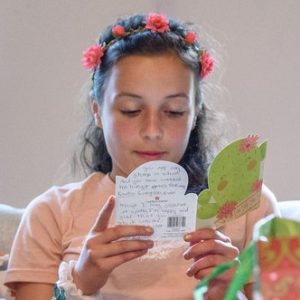 tape a piece of gum. On a birthday I may add a couple of dollars. That’s all. Years ago, as a family, we determined that we would not spend lots of money on gifts for either birthdays or holidays. We have all stuck with that intention. However, my grandchildren have other grandparents who send cool gifts in the mail. I worried about that. But I didn’t need to.
tape a piece of gum. On a birthday I may add a couple of dollars. That’s all. Years ago, as a family, we determined that we would not spend lots of money on gifts for either birthdays or holidays. We have all stuck with that intention. However, my grandchildren have other grandparents who send cool gifts in the mail. I worried about that. But I didn’t need to.
 In honor of the Great American Pie Month, I want to share a story that illustrates the difference between kids and adults. Understanding this can make all the difference in how much you enjoy being and working with them and it can also impact your enjoyment whenever you learn something new.
In honor of the Great American Pie Month, I want to share a story that illustrates the difference between kids and adults. Understanding this can make all the difference in how much you enjoy being and working with them and it can also impact your enjoyment whenever you learn something new.

 We’re all looking for simple ways to connect with our families despite how busy life has gotten. One technique I really enjoy is that of mini-conversations. Conversing with children and teens can be fun, relaxing, and energizing, and sometimes we learn something new.
We’re all looking for simple ways to connect with our families despite how busy life has gotten. One technique I really enjoy is that of mini-conversations. Conversing with children and teens can be fun, relaxing, and energizing, and sometimes we learn something new. Let me give you an example. When my youngest daughter was twenty, she was reading Incidents in the Life of a Slave Girl by Harriet A. Jacobs. She asked me to read the book because she wanted to talk about it. Over the few weeks that it took her to read the book we had conversations about the character of different people in the book, why people act the way they do and believe the things they do, and how to be better people ourselves.
Let me give you an example. When my youngest daughter was twenty, she was reading Incidents in the Life of a Slave Girl by Harriet A. Jacobs. She asked me to read the book because she wanted to talk about it. Over the few weeks that it took her to read the book we had conversations about the character of different people in the book, why people act the way they do and believe the things they do, and how to be better people ourselves. letter. She wrote back commenting about freedom and the fact that I had recently attended a caucus. We had a mini-conversation via mail about what a caucus is and who can go and why they would go. That led to a conversation back and forth about Fredrick Douglas, who he was, and how he worked for freedom for slaves, women, and other minority groups. With the advent of technology, we can have these types of mini-conversations face to face no matter what distance we must traverse.
letter. She wrote back commenting about freedom and the fact that I had recently attended a caucus. We had a mini-conversation via mail about what a caucus is and who can go and why they would go. That led to a conversation back and forth about Fredrick Douglas, who he was, and how he worked for freedom for slaves, women, and other minority groups. With the advent of technology, we can have these types of mini-conversations face to face no matter what distance we must traverse. Jack, my grandson, who was two at the time, had a dear friend who turned 90. He gave Jack a bunch of helium-filled balloons from his party. Jack and I took one balloon to the front yard and let it go. As it floated upward, we had a mini-conversation. It went like this:
Jack, my grandson, who was two at the time, had a dear friend who turned 90. He gave Jack a bunch of helium-filled balloons from his party. Jack and I took one balloon to the front yard and let it go. As it floated upward, we had a mini-conversation. It went like this: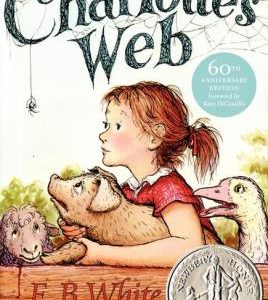
 Jodie was reading the book Charlott’s Web to her children. Frequently she would stop and ask a question. “What does manure mean?” “What does loft mean?” What does slop mean”? “What is a manure pile?” When the term manure pile came up again, later in the story, Jodie emphasized the term as she read. Then she asked, “Do you remember what manure pile means?” I heard, “Eweee, a pile of poop.” Then laughter.
Jodie was reading the book Charlott’s Web to her children. Frequently she would stop and ask a question. “What does manure mean?” “What does loft mean?” What does slop mean”? “What is a manure pile?” When the term manure pile came up again, later in the story, Jodie emphasized the term as she read. Then she asked, “Do you remember what manure pile means?” I heard, “Eweee, a pile of poop.” Then laughter.
 The idea that we should be careful to keep our priorities right in terms of not letting lesser concerns get in the way of greater ones so that we find ourselves “in the thick of thin things,” is good advice.
The idea that we should be careful to keep our priorities right in terms of not letting lesser concerns get in the way of greater ones so that we find ourselves “in the thick of thin things,” is good advice.



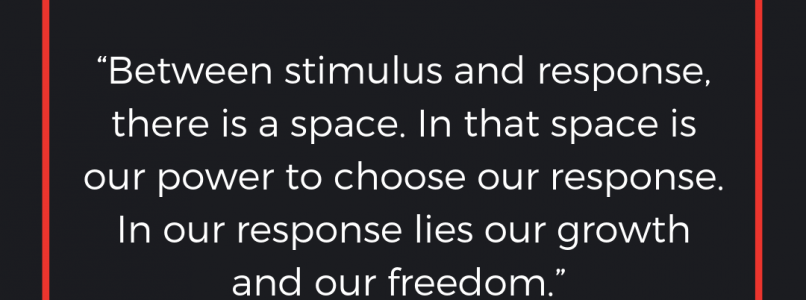
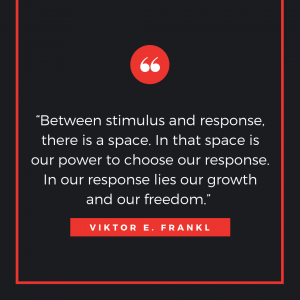 I bet you clicked this email because the subject line ticked you off! Twenty years ago, it would have ticked me off too. However, I hope to move you in the direction of accepting this as true because it has great bearing on what
I bet you clicked this email because the subject line ticked you off! Twenty years ago, it would have ticked me off too. However, I hope to move you in the direction of accepting this as true because it has great bearing on what

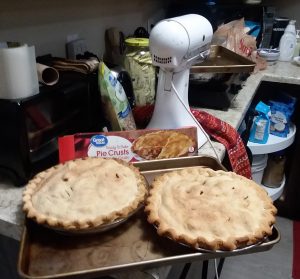 her she said that she was having tons of visits and treats but that her family could use some nurturing. Hence one apple pie.
her she said that she was having tons of visits and treats but that her family could use some nurturing. Hence one apple pie.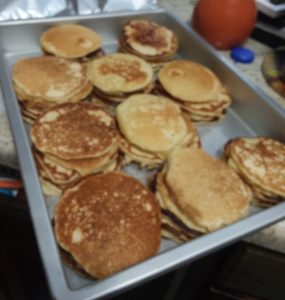 Saturday morning our church planned a Christmas breakfast. That’s right, breakfast. I would have opted to take a breakfast casserole, but my husband has a family tradition of Green Chili Pancakes and it’s so unique that he really wanted to share
Saturday morning our church planned a Christmas breakfast. That’s right, breakfast. I would have opted to take a breakfast casserole, but my husband has a family tradition of Green Chili Pancakes and it’s so unique that he really wanted to share  it. The problem is, he doesn’t know how to make it, I do. His grannie taught me. : ) So I needed to make 50 pancakes and then a huge pot of the green chili sauce. It was too much to do Saturday morning, so it had to be done on Friday. This is very delicious by the way.
it. The problem is, he doesn’t know how to make it, I do. His grannie taught me. : ) So I needed to make 50 pancakes and then a huge pot of the green chili sauce. It was too much to do Saturday morning, so it had to be done on Friday. This is very delicious by the way.  Long story. And I also realized that I needed a formatted document to include with a special framed family genealogy chart we are sending to our children. We are direct descendants of William Brewster of the Mayflower and I wanted to help each family understand who he was, what his family was like, and why they came to America.
Long story. And I also realized that I needed a formatted document to include with a special framed family genealogy chart we are sending to our children. We are direct descendants of William Brewster of the Mayflower and I wanted to help each family understand who he was, what his family was like, and why they came to America. It’s Saturday morning now. The church breakfast is done. The chili pancakes were a success. Everyone loved the pies which have been eaten and I am heading off to do the tent kit and get the rest of the stuff wrapped and shipped. My house is a disaster and the kitchen cabinets can’t even be seen. I haven’t vacuumed, dusted, or cleaned anything. Laundry is piling up but I did get one load in before the breakfast. Another big woohoo!
It’s Saturday morning now. The church breakfast is done. The chili pancakes were a success. Everyone loved the pies which have been eaten and I am heading off to do the tent kit and get the rest of the stuff wrapped and shipped. My house is a disaster and the kitchen cabinets can’t even be seen. I haven’t vacuumed, dusted, or cleaned anything. Laundry is piling up but I did get one load in before the breakfast. Another big woohoo!